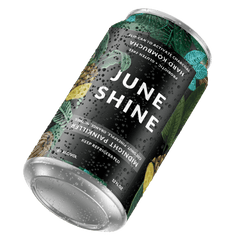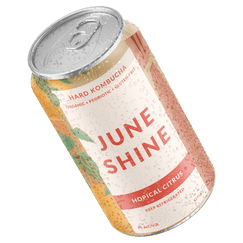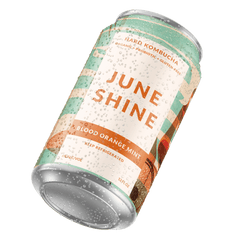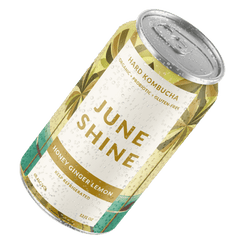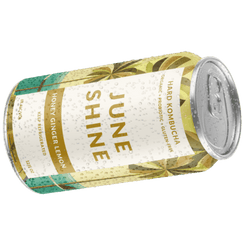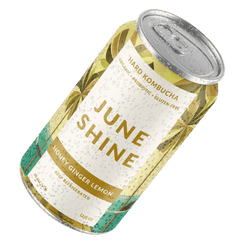Kombucha vs. Wine: What You Didn’t Know

You work hard, and you play hard. You also happen to like your drinks hard. Two common adult beverages are wine and kombucha. We’ve researched and found some interesting tidbits that separate the two.
While your drinks are hard, the selection process shouldn’t be. Whether your drink decisions are based on nutrition, taste, production process, or how the libation fits in with your lifestyle, we’ve laid out some key takeaways.
What Is Kombucha?
You’ve undoubtedly heard of kombucha. You might be a booch connoisseur, or maybe you’re ready to give it a go for the first time.
Kombucha is a fermented drink made from green or black tea and a sweetener, typically sugar. JuneShine kombucha is a little different from the standard booch. We use green tea and use all-natural, organic honey as our sweetener.
After these two main ingredients are brewed, our kombucha is fermented not once but twice. Due to the process of fermentation, all kombucha has some alcoholic content, typically very low. The second fermentation allows us to increase flavor and alcohol content, leaving us with a 6% ABV.
Some say JuneShine is the champagne of kombuchas. With a crisp, refreshing taste and fizzy effervescence, the final product is an insanely delicious hard kombucha.
What Is Wine?
Dive into the world of wine, and you’re bound to find some major enthusiasts. It’s almost a cult-like club.
Like kombucha, wine is a fermented drink. Instead of a tea base, wine is most often crafted with grapes and water. Grapes are picked, crushed, and the residual juice is fermented and aged. The varieties of wine range greatly depending on sweetness, color, and carbon dioxide levels.
The ABV (Alcohol By Volume) in wine can vary greatly. The average glass of wine contains about 11% alcohol. However, there are many outliers to that number. Some wines like Moscato have 5%, and others like Portuguese Madeira contain 20% alcohol.
Nutritional Differences Between Kombucha and Wine
Not only in the fundamental ingredients, but there are also key differences between wine and kombucha when looking at the nutritional information.
Kombucha vs. Wine: Ingredients
The ingredients in basic kombucha are pretty straightforward — tea and a sweetener. After that, fruit juices and spices may be added to enhance flavors. But that’s it. There aren’t any weird, fake additives in kombucha—at least not our hard kombucha.
It’s not that simple with wine’s ingredients. We know that wine starts with grapes and water. After the juices are left to ferment, some pretty frightening chemicals are added. Ranging from clarifying the colors of the wine to amplifying aromas, these additives are anything but natural.
As people become more conscious about the ingredients in their food and drinks, it’s a little concerning how little we know about what is in wine. Wine companies aren’t even required to list their ingredients on the labels—not okay if you ask us.
Calories
Ah, the days of not worrying about calories. Unfortunately, those carefree days are long gone for most of us.
Hard kombuchas contain between 100 and 160 calories per serving. All of our flavors have 150 calories or less per can. For those looking to limit calorie consumption even further, we launched our JuneShine100 line. These options are light made right, and they’re refreshing, low calorie, and high quality.
The caloric content in wine is another story. Generally, a six-ounce glass of wine contains between 150 and 200 calories. There are exceptions to that rule, though. Sweeter dessert wines can pack up to 275 calories per three-ounce serving.
Sugars
As 10.5% of Americans had metabolic disorders in 2018, we’re going to go out on a limb here and say some of you may be monitoring your sugar intake, and the difference between wine and hard kombucha is major.
The sugar content in hard kombucha can vary greatly. Some brands advertise zero sugars, others packing 10 to 12 grams of sugar per serving. Here’s the thing with zero grams of sugar — kombucha is fermented, so it’s going to have some sugar. If it doesn’t, you need to ask yourself what is being put into that drink to bring the sugars down so low.
All Junies contain three grams of sugar or less in each can. That’s because we are putting real, honest ingredients in there. You aren’t going to have zero grams of sugar when you use natural elements that are fermented.
Wine probably isn’t your best friend if you’re watching your sugar consumption. Ranging from one gram of sugar to a head-spinning 200 grams per serving, it varies quite a bit in the type of wine. Multiple factors go into the sugar content of wines, ranging from the types of grapes used to the length of aging.
Taste
The flavors of wine and hard kombucha can vary greatly. Both have varieties ranging from tart to very sweet.
Hard kombucha has an array of flavors. Some are fruity; others are more tart. We use Jun kombucha, which gives you a smoother sip and a lighter taste. Regardless of the flavor option you choose, our hard kombucha delivers a crisp, refreshing taste with fizziness for a little extra pop. From there, you’ll find flavors like Hopical Citrus and Midnight Painkiller to mix it up even further.
Wine also varies significantly when choosing based on taste, because there are tons of varieties in the world of wine. Because this is such an involved process, there are actually trained professionals (sommeliers) who taste wine for a living. The taste of wine ranges from sweet and light to dry and heavy, with a lot in between.
Lifestyle
Depending on your lifestyle, your drink of choice is going to differ. If you’re spending the days soaking up the sun and catching waves, your drink selection is going to be very different from someone who is schmoozing with the inlaws or headed for a day at the spa.
Let’s go with the surf scenario. Post shred, you also most likely aren't going to have a bottle of wine in your beach bag. Hard kombucha is easily thrown in your bag or cooler and toted around as you explore the natural world.
If you’re somewhere that has glassware easily accessible, wine might be fine. But once you experience bright, bubbly booch, you won’t want anything else.
Conclusion
There’s a person out there for everyone, and there’s a drink out there for everyone. The question for you is deciding which one is best suited for your preferences, whether they are based on lifestyle, taste, or nutrition.
We can’t assure you what is in your wine bottle, but we can tell you what is in JuneShine. No junk, just real ingredients.
If you’re a booch expert, we’ve got our core flavors (plus more on tap at our tasting rooms).
If you’ve steered toward wine in the past, we’ve got a flavor that we think you might like. Acai Berry is made with organic acai and blueberries. It satisfies like a glass of wine but refreshes like a JuneShine. It’s fruity, it’s botanical, and in our opinion, it’s perfection.
Sources:
What Is Hard Kombucha, and Is It Healthy? Here's What Nutritionists Say | Health.com
